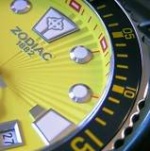
A place to enjoy watches and everything in between !
|
|
| | Do autos really "break in"? |  |
| | | Author | Message |
|---|
Guest
Guest

 |  Subject: Do autos really "break in"? Subject: Do autos really "break in"?  Sat Mar 13, 2010 3:06 pm Sat Mar 13, 2010 3:06 pm | |
| I've heard conflicting reports on this recently. If a new watch is running a few seconds off, will the watch acutally "break in" or imrove in accuracy over time? If so, by how
much? Anyone here witness it personally? |
|   | | ramirez1970
Associate

Posts : 275
Join date : 2009-12-01
 |  Subject: Re: Do autos really "break in"? Subject: Re: Do autos really "break in"?  Sat Mar 13, 2010 4:22 pm Sat Mar 13, 2010 4:22 pm | |
| I believe that this is true. I'm under the impression though that typically automatic watches run a little "fast" initially then "settle down" over a relatively short period of time. My Seiko OM, when I first got it, was running about + 15 seconds/24 hours and now runs on the order of +6 seconds/24 hours. | |
|   | | sixtysix
Consigliere

Posts : 7589
Join date : 2009-12-06
Age : 58
Location : North of Syracuse NY
 |  Subject: Re: Do autos really "break in"? Subject: Re: Do autos really "break in"?  Sat Mar 13, 2010 7:10 pm Sat Mar 13, 2010 7:10 pm | |
| I think any mechanical device will break in a bit over it's initial run in, a car, a watch, a pump...really anything. It may be ever so slight depending on the tolerences and care something it built with. I think it is wise to let a watch run in for a a few week to a month before you statrt to adjust anything, that way any initial wear points have a chance to stabilize. ____________________________________ Later, Gary Remember we are the caretakers of mechanical art..... Remember we are the caretakers of mechanical art.....
Member NAWCC, National Association of Watch & Clock Collectors | |
|   | | Anomaly
Senior Associate

Posts : 7125
Join date : 2009-11-13
Age : 60
Location : Tampa, Florida
 |  Subject: Re: Do autos really "break in"? Subject: Re: Do autos really "break in"?  Sat Mar 13, 2010 7:40 pm Sat Mar 13, 2010 7:40 pm | |
| I have heard of SLIGHT changes...
...+/- a FEW seconds, but nothing MAJOR. ____________________________________  | |
|   | | Guest
Guest

 |  Subject: Re: Do autos really "break in"? Subject: Re: Do autos really "break in"?  Sat Mar 13, 2010 8:21 pm Sat Mar 13, 2010 8:21 pm | |
| My purely anecdotal; answer: I never think of adjusting a watch until it's been worn a few times--I've had wonky results right after putting on a newly arrived watch that have settled out fine on their own in a day or two. |
|   | | Guest
Guest

 |  Subject: Re: Do autos really "break in"? Subject: Re: Do autos really "break in"?  Sat Mar 13, 2010 11:35 pm Sat Mar 13, 2010 11:35 pm | |
| gotcha, thx all.
so Ron, "a day or two" is a reasonable amount of time to expect changes, if any? Or is the adjusting period longer? |
|   | | AtomicTom
Senior Consigliere

Posts : 19941
Join date : 2009-08-25
Age : 53
Location : New Jersey
 |  Subject: Re: Do autos really "break in"? Subject: Re: Do autos really "break in"?  Sun Mar 14, 2010 1:32 am Sun Mar 14, 2010 1:32 am | |
| Haven't seen this personally ! I'll need to get some more automatic watches to test this out !   ____________________________________  | |
|   | | Guest
Guest

 |  Subject: Re: Do autos really "break in"? Subject: Re: Do autos really "break in"?  Sun Mar 14, 2010 3:06 am Sun Mar 14, 2010 3:06 am | |
| your watch was running before it ever left the factory so whats to break in?using a car as an example doesn't fly.maybe a bicycle sinces its purely mechanical.an engine requires heat cycles to break in.Do it wrong and you'll have a low powered oli burner.do it right and you'll have a great engine.
I've never observed a movement settle after owning hundreds of them.if they arrive running 15+ a day,thats where it stays.the only difference in rate is in positions.some might observe that the watch was running fast over a week but slow over the next week.look at what you did differently to cause the rate change.
it takes years of use for any gear in a movement to show wear.it takes years for the mainspring to fatigue and the balance spring to weaken but a bedding in period? no.if so then prove it by imperical data.otherwise its another frigging myth. |
|   | | Guest
Guest

 |  Subject: Re: Do autos really "break in"? Subject: Re: Do autos really "break in"?  Sun Mar 14, 2010 6:58 am Sun Mar 14, 2010 6:58 am | |
| - FreeDive wrote:
- gotcha, thx all. so Ron, "a day or two" is a reasonable amount of time to expect changes, if any? Or is the adjusting period longer?
If I'm the Ron you meant, I'd absolutely take Yamahaki's word over mine on this issue. I think it probably counts for something that most of my watches are old and some probably haven't run in decades before they came to me. I've had a couple that seemed to be out by maybe 10 seconds or so that (again) *seemed* to run better after a day or so on the wrist. But that's an impression because I don't pay all that much attention except when I'm working on a schedule of some sort. |
|   | | Guest
Guest

 |  Subject: bedding in bump Subject: bedding in bump  Sun Mar 14, 2010 4:08 pm Sun Mar 14, 2010 4:08 pm | |
| *Reply in edit process... |
|   | | Guest
Guest

 |  Subject: Re: Do autos really "break in"? Subject: Re: Do autos really "break in"?  Sun Mar 14, 2010 4:49 pm Sun Mar 14, 2010 4:49 pm | |
| You have an interesting way of "not getting into politics". Still, that was a fun and interesting read.
But you left out a large factor. Prior to the post-Nixon opening up of Chinese markets, and especially before the absorbing of Hong Kong, the PRC wasn't at all known for manufacturing dirt cheap watches--even though Hong Kong always was.
The indigenous mainland watchmakers were well employed making quite decent watches for the very protected mainland market--but the opening of the mainland markets to foreign competition hit the PRC watchmakers hard because the Chinese mainlanders were very attracted to the flashy European brands and, of course, that included quartz which had slammed the European mechanical builders, too. That made for huge unemployment among the mainland Chinese watchmakers.
:-) The Hong Kong cheapmeisters were extremely happy to re-employ the laid off mainland watchmakers--they were thrilled to find thousands of skilled line workers willing to work for very low wages. As a consequence PRC quality control (manufacturing standards, proper oiling, alloy quality, etc) plummeted across the entire mainland of China.
It is only quite recently that things are improving with companies like Sea-Gull, Beijing and some others working hard to bring quality back up, at least in their own watches (I say this because it is well known that Sea-Gull, for example, has grades of movements using the best for their own, selling higher grades to more expensive, better quality contractors while selling low grades in huge numbers to low end makers).
Mind you, at any build level, one thing Lysanderiii's numerous well-documented teardowns make very clear: most mainland Chinese movements are still quite decently built at the level of parts but--and exactly as you said--dirt and lack of oiling (in other words, crappy quality control and dirty conditions) in assembly areas are the main culprits in poor performance from lower end Chinese watches. |
|   | | Guest
Guest

 |  Subject: Re: Do autos really "break in"? Subject: Re: Do autos really "break in"?  Sun Mar 14, 2010 5:01 pm Sun Mar 14, 2010 5:01 pm | |
| - AlbertaTime wrote:
- You have an interesting way of "not getting into politics". Still, that was a fun and interesting read.
But you left out a large factor. Prior to the post-Nixon opening up of Chinese markets, and especially before the absorbing of Hong Kong, the PRC wasn't at all known for manufacturing dirt cheap watches--even though Hong Kong always was.
The indigenous mainland watchmakers were well employed making quite decent watches for the very protected mainland market--but the opening of the mainland markets to foreign competition hit the PRC watchmakers hard because the Chinese mainlanders were very attracted to the flashy European brands and, of course, that included quartz which had slammed the European mechanical builders, too. That made for huge unemployment among the mainland Chinese watchmakers.
:-) The Hong Kong cheapmeisters were extremely happy to re-employ the laid off mainland watchmakers--they were thrilled to find thousands of skilled line workers willing to work for very low wages. As a consequence PRC quality control (manufacturing standards, proper oiling, alloy quality, etc) plummeted across the entire mainland of China.
It is only quite recently that things are improving with companies like Sea-Gull, Beijing and some others working hard to bring quality back up, at least in their own watches (I say this because it is well known that Sea-Gull, for example, has grades of movements using the best for their own, selling higher grades to more expensive, better quality contractors while selling low grades in huge numbers to low end makers).
Mind you, at any build level, one thing Lysanderiii's numerous well-documented teardowns make very clear: most mainland Chinese movements are still quite decently built at the level of parts but--and exactly as you said--dirt and lack of oiling (in other words, crappy quality control and dirty conditions) in assembly areas are the main culprits in poor performance from lower end Chinese watches. Ron, Thanks, always learn more about the Chinese watches when I read your posts. Won't speculate about who Sea-Gull sells their higher grades to or who gets the low grades in huge numbers.  |
|   | | Guest
Guest

 |  Subject: Re: Do autos really "break in"? Subject: Re: Do autos really "break in"?  Sun Mar 14, 2010 5:49 pm Sun Mar 14, 2010 5:49 pm | |
| |
|   | | Guest
Guest

 |  Subject: Re: Do autos really "break in"? Subject: Re: Do autos really "break in"?  Sun Mar 14, 2010 7:06 pm Sun Mar 14, 2010 7:06 pm | |
| I was asked to edit my post.I'll leave it deleted.it was meant for fun only.Mainly to get the point accross that bedding in isn't a reality.I'll have a new watch here wed. and do a two week thread about how its running and if its performance changes over those two weeks.I think that would be fair.This one will be a cosc movement.I'll also have my watchmaker use his machine and print out its rate when it arrives.I'll have him do it again in two weeks.that will give the definitive and mine will be by observation. |
|   | | Guest
Guest

 |  Subject: Re: Do autos really "break in"? Subject: Re: Do autos really "break in"?  Sun Mar 14, 2010 10:21 pm Sun Mar 14, 2010 10:21 pm | |
| sean i didn't get to read your original post, but i'm looking forward to your tracking this new COSC coming in! |
|   | | Sponsored content
 |  Subject: Re: Do autos really "break in"? Subject: Re: Do autos really "break in"?  | |
| |
|   | | | | Do autos really "break in"? |  |
|
Similar topics |  |
|
| | Permissions in this forum: | You cannot reply to topics in this forum
| |
| |
| |
|
